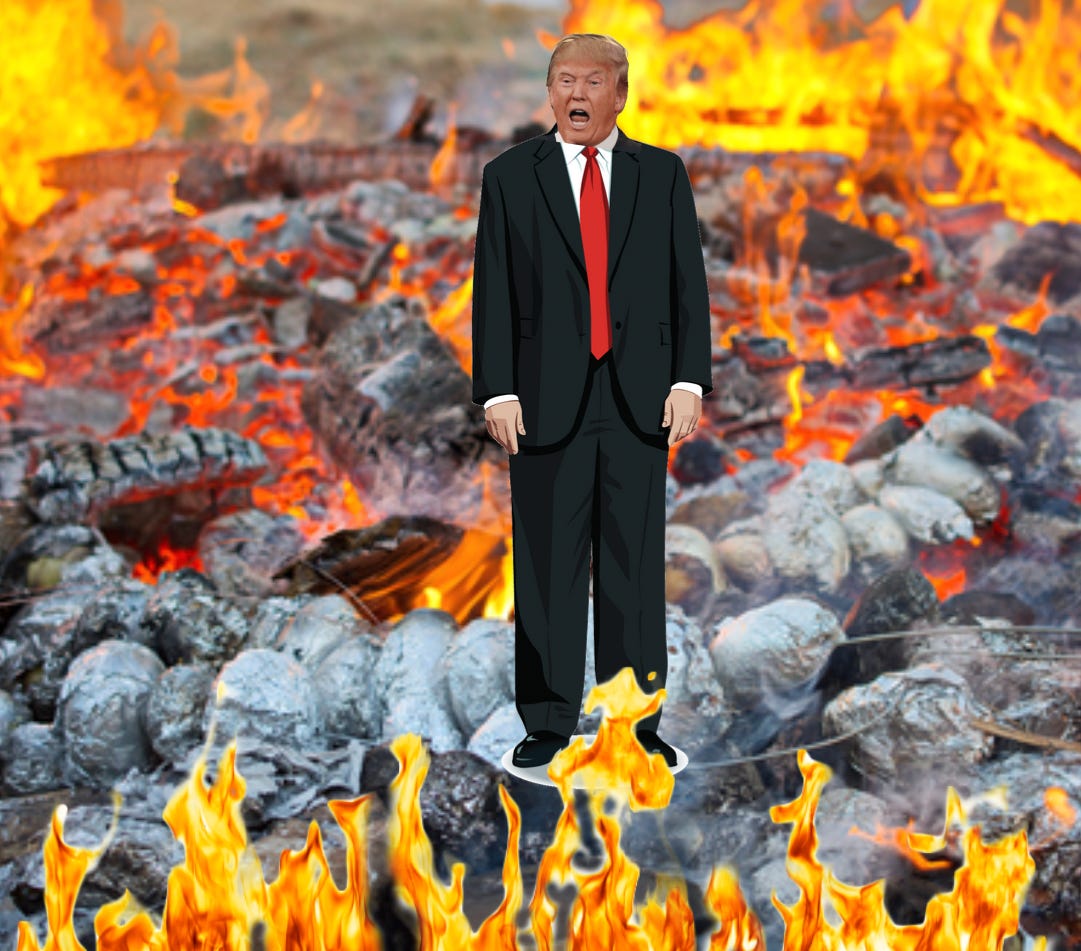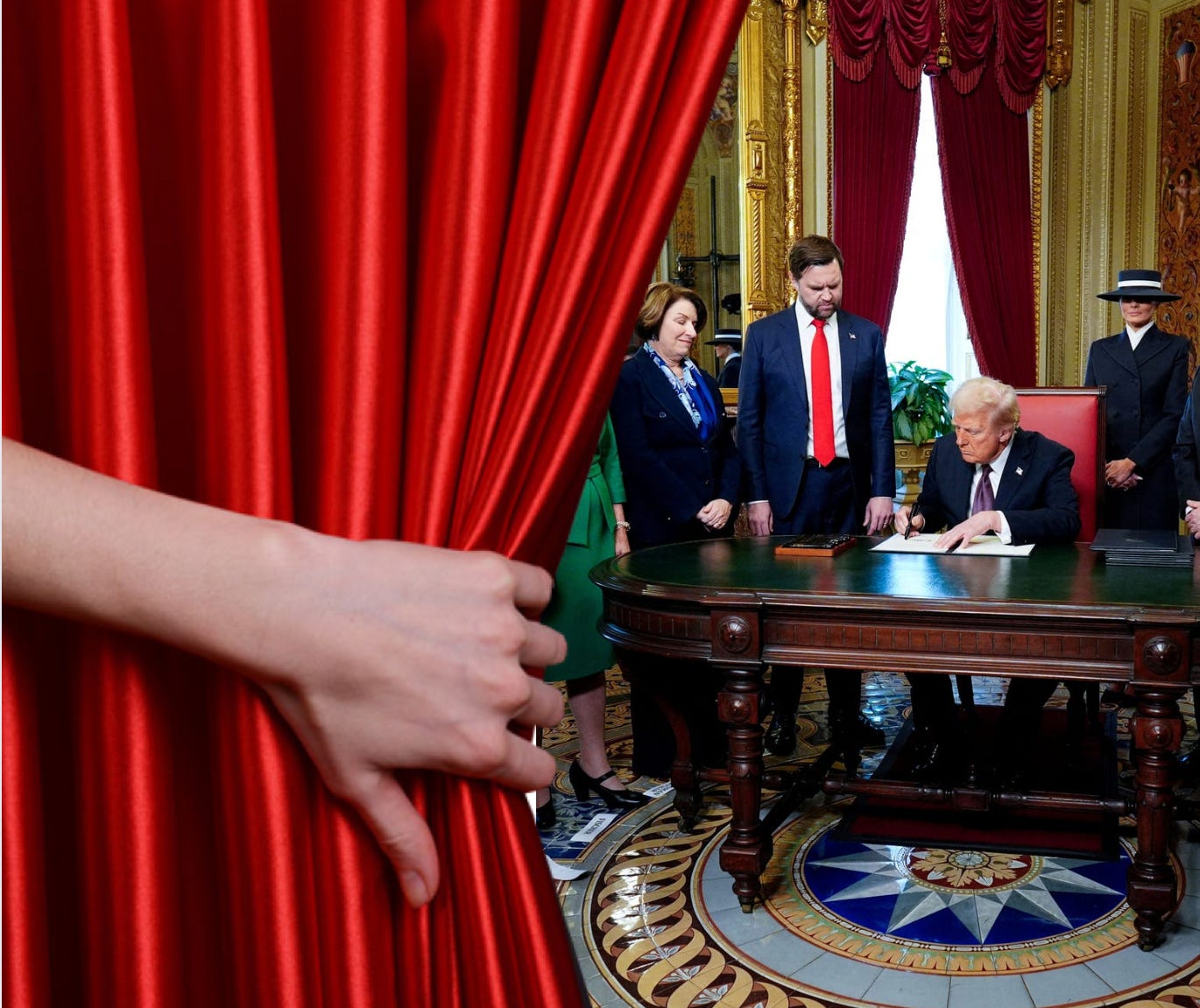TRUMP'S ON A ROLL or is he?
Now is the time to put pedal to the medal ...HOLD HIS FEET TO THE FIRE
https://www.whitehouse.gov/presidential-actions/2025/01/withdrawing-the-united-states-from-the-worldhealth-organization/
Today marks a significant shift in global geopolitics as President Donald Trump took office and immediately announced that the United States would withdraw from the World Health Organization (WHO). While this move has drawn both praise and criticism, it opens a crucial window for Canadians to reflect on our country’s entanglements with the United Nations (UN) and its subsidiaries. Canada must seize this momentum, not only to evaluate its relationship with the WHO but also to push for full withdrawal from the UN and its interconnected organizations.
The executive order outlining the United States' withdrawal from the WHO uses strong and unequivocal language to communicate the intent to sever ties (hmmm, well if JT can use it I guess Trump can too). However, the details of implementation, such as timelines, financial dis-entanglements, and the status of ongoing collaborations, introduce elements that could be interpreted as ambiguous. For instance, in Trump’s first term, a claimed defunding of the WHO but then redirected funds to Gavi, the Vaccine Alliance, raising questions (albeit without answers) about whether the move was genuine or just more political theatre.
This ambiguity, whether intentional or not, could affect the global perception of the withdrawal and its ultimate impact. For Canadians, this highlights the need for vigilance and clarity as we push for a similar disengagement. A well-defined plan that addresses these nuances is essential to ensuring that any withdrawal aligns with national interests and avoids unintended consequences.
The WHO has been at the forefront of global health policy, BUT its initiatives are tied directly into the broader UN Agenda 2030, which seeks to implement the Sustainable Development Goals (SDGs). These goals, while wrapped in language of sustainability and equity, come with significant costs to not just national sovereignty but the very survival of the people in these nations. Policies on climate change, public health, and food systems are centralized through UN mandates, leaving individual nations with diminished control over their own futures.
Further, it’s worth noting that Trump met with Bill Gates for three hours before his recent inauguration (Jan 20, 2025). For critically thinking citizens, this raises alarms about whether this withdrawal is another act in a well-orchestrated performance. Canadians must watch closely and question any gaps in transparency to avoid being misled by similar gestures from our own leaders (ya all recall Justin INTENDS to resign…Trumps use of the word INTENDS is a red flag for me). Read the very language in his executive order, Let’s have a closer look shall we:
Sec. 2. Actions. (a) The United States intends to withdraw from the WHO.
(d) The Secretary of State and the Director of the Office of Management and Budget shall take appropriate measures, with all practicable speed, to:
(i) pause the future transfer of any United States Government funds, support, or resources to the WHO;
??? why pause … pause /pôz/
intransitive verb
To cease or suspend an action temporarily.
"She paused in her piano exercises to listen for the baby."
To hesitate.
"He paused before replying."
To linger; tarry.
"We paused for a while under the huge oak tree."
(iii) identify credible and transparent United States and international partners to assume necessary activities previously undertaken by the WHO.
Well now if that ain’t a backdoor I don’t know what is…
To add to the latest theatics: Trump also announced that the United States would withdraw from the Paris Agreement, a cornerstone of the UN’s climate change agenda. This move appears to further underscore his commitment to prioritizing national interests over globalist frameworks. While the Paris Accord is framed as a cooperative effort to combat climate change, it imposes restrictive policies. Trump also signed an executive order to end radical and wasteful Diversity, Equity, and Inclusion (DEI) programs within the U.S. government. By reversing these policies, it APPEARS Trump is taking another step toward dismantling the ideological frameworks often tied to UN initiatives.
It’s certainly is easy to see why so many people cheer Trump’s bold actions, like pulling out of the Paris Accord, defunding DEI programs, or distancing the U.S. from the WHO. These moves are headline-grabbing, emotionally satisfying, and feel like the pushback against globalism that many crave.
But beneath the surface, these actions often lack the structural changes necessary to dismantle the deeply entrenched systems driving these agendas.
Take the Paris Accord, for instance. Withdrawing from it made a statement, but it didn’t stop other UN-aligned organizations, multinational corporations, or even domestic entities from implementing the same sustainability initiatives under the banner of Agenda 2030. Similarly, cutting federal funding for DEI programs may slow their momentum, but it doesn’t address the way these principles are embedded into corporate governance, academia, and international NGOs. These “back doors” allow globalist agendas to continue operating unabated, even when the front door is slammed shut.
This is where Trump’s supporters need to PAUSE and reflect.
Now is a good time to use that intransitive verb
To cease or suspend an action temporarily.
"She paused in her piano exercises to listen for the baby."
To hesitate.
"He paused before replying."
To linger; tarry.
"We paused for a while under the huge oak tree."
“we paused to pull the curtain back to sift thru the weeds”
Are these moves truly victories, or are they political theater, grand gestures that fail to strike at the root of the problem? The truth is that executive orders and public proclamations often make great headlines but leave the mechanisms of global governance intact. Without addressing the broader influence of the UN and its network of organizations, these actions are little more than temporary roadblocks on an otherwise unimpeded path.
The average person doesn’t always connect these dots. They hear what they want to hear, celebrating symbolic gestures while overlooking the systemic vulnerabilities that remain. It’s easy to be swept up in the emotion of “winning,” but failing to read between the lines allows globalist agendas to quietly march on, just under a different guise. If we’re serious about holding Trump and any leader (of any country, of any level of government) accountable, we must demand more than slogans and surface-level actions. We must insist on a strategy that closes the back doors for good and addresses the structural power of global institutions like the UN. Anything less is just theater.
I THINK Y’ALL KNOW HOW I FEEL ABOUT THEATRE
I am trading my tickets in for ACTION
While Trump’s declares his intent to exit the WHO and the Paris Accord and defund DEI programs have certainly made waves, it’s essential to recognize that these actions alone do very little to dismantle the broader globalist structures they supposedly oppose. In fact they do the opposite as the people get lulled into the “we win” mentality.
To truly extricate the U.S. from the clutches of global governance, it’s not enough to merely signal intent or make symbolic gestures. What’s needed is a comprehensive disengagement from the UN system itself, particularly the networks of organizations and frameworks that persist behind the scenes, continuing to influence domestic policies long after executive orders are signed.
Exiting the WHO, for example, isn’t as simple as declaring an intent to leave. True disengagement would require uprooting a complex, interconnected web of institutions, financial systems, and political mechanisms that empower the WHO to shape global health policies. This includes dismantling the National Focal Point (NFP) system, which facilitates massive, unchecked transfers of funds between governments and international organizations, bypassing national economic regulations. These funds are often funneled through entities like the WHO, creating a parallel financial network that undermines national sovereignty and evades traditional financial oversight. Simply withdrawing from the WHO doesn’t cut these financial ties; it only closes the front door while the back door remains wide open for continued influence and control.
To truly protect national autonomy, there must be a public, forceful rejection of the IHR amendments, signaling that no part of the global health framework will override the sovereignty of states. This is not just a matter of withdrawing from a specific agreement; it’s about dismantling the entire hierarchy of global health governance that operates through organizations like the WHO and its affiliates, such as PAHO.
The challenge is daunting, as it requires more than just an intention to exit from select programs. It demands a full-scale reevaluation of the systems and mechanisms that tie nations to the globalist agenda. From the financial flows funneled through the NFP system to the institutional structures that enable the WHO to exert power over national health decisions, each layer must be peeled back and severed to reclaim true independence. Unfortunately surface-level actions, like Trump’s executive orders, fall short. They may appear to strike a blow against the visible manifestations of globalism, but they fail to address the deep, embedded systems that continue to perpetuate the very agendas they claim to oppose.
If we are serious about reversing the tide of globalist control, we must push for bold, structural changes that go far beyond symbolic gestures. It’s not enough to simply exit agreements or issue executive orders; we must dismantle the infrastructure that underpins global governance. Only by severing these deep-rooted connections will we be able to chart a course toward genuine sovereignty and autonomy, free from the influence of unelected global organizations like the WHO and it’s parent the United Nations.
Canadians must ask themselves a critical question: how would becoming the 51st state of the U.S. truly advance our sovereignty or keep us safer? While Trump and Trudeau may appear to be political opposites, their language often aligns, particularly in their nods to globalist agendas. Trump has skillfully manipulated public perception, convincing many he opposes global control, yet his actions failed to fundamentally disentangle the U.S. from the grip of the UN or its sprawling influence.
The only way to achieve true sovereignty is a complete severing from the United Nations and all its tentacles. Partial measures and political gestures only allow globalist agendas to remain entrenched, reemerging under different guises. Frameworks like the WHO, the Paris Accord, and DEI are all interwoven, ensuring control persists even if one branch is removed. Without dismantling the entire system, autonomy remains an illusion, leaving nations vulnerable to the same centralized control.
dig deep my friends dig deep… take action at TweetTrumpNow.comTweetTrumpNow.com
https://www.globalchange.gov/our-work/intergovernmental-panel-on-climate-change
https://www.paho.org/en
https://www.hhs.gov/equity/index.html












I believe you hit the nail on the head. I would not have said this a mere day ago. I would have thought your skepticism was prudent but ultimately Trump would prove you wrong. Unfortunately, Trump has completely crushed my brimming-over hope with his announcement of the ludicrous plan to “cure” cancer with a personalized mRNA injection via AI. He has basically gutted all the good he might have done with this one action. This is the reason he has yet to call the injections out for what they are, death jabs, and the reason we don’t hear RFK Jr speaking out against “vaccines”.
EXACTLY!
Slogans and theater to lull the masses, especially the tone deaf MAGA crowd.
Interesting how the cornerstone of MAHA, RFK jr., was silent on that executive order and had no influence to change the soft wording and open door to Gavi.